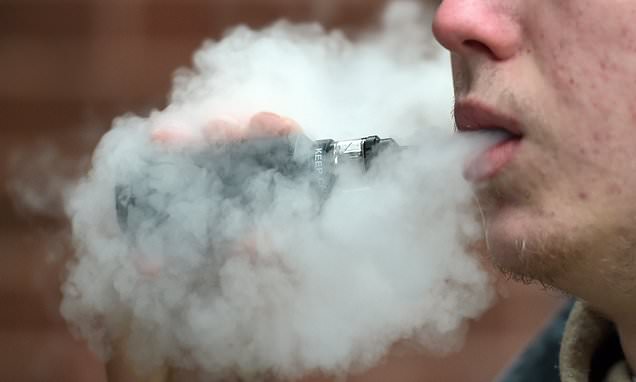Young vapers are up to 75% more likely to suffer anxiety, study finds
Young vapers are up to TWICE as likely to suffer depression, anxiety or panic attacks than non-users, according to ANOTHER damning study
- Researchers led by the American Heart Association surveyed 2,500 children
- Up to 70 percent of those who vaped THC-only reported anxiety
- READ MORE: Vaping can raise your risk of oral cancer, study suggests
Young vapers are up to two times more likely to suffer mental health problems compared to non-users, according to another damning study.
Researchers led by the American Heart Association surveyed 2,500 children and young adults from 13 to 24 years old online.
Up to 70 percent of those who vaped THC-only reported suffering anxiety such as worries, flashbacks and panic attacks in the past week. For comparison, among the participants who never vaped 40 percent reported this.
Half of the vapers also said they had depression, compared to 25 percent of those in the non-vaping group. The scientists noted that youngsters are more vulnerable to addiction to nicotine products, raising questions about why people were taking up the habit.
The study is another setback for those who argue vapes are a healthy alternative to cigarettes, with previous research linking them to cancer, heart disease and other negative effects.

Researchers led by the American Heart Association found young people using vapes were more likely to have depression, anxiety or panic attacks (stock image)
E-cigarettes were once held up as the healthy way to quit smoking, but a slew of studies has now warned of the risks they pose.
Just this month a study warned they raise the risk of oral cancer by the same amount as cigarettes, while in January another paper found the devices leave patients at higher risk of lung inflammation.
Earlier this week it was even revealed that a 45-year-old from Indiana coughed up three pints of blood and was hospitalized after using the devices.
Dr Joy Hart, a health communication expert at the University of Louisville in Kentucky, said: ‘Younger people have long been vulnerable to tobacco use, may experience greater harm from nicotine and other drugs and may be targeted by tobacco advertisers and marketers.
Vapes cause MORE lung inflammation than normal cigarettes

A study by University of Pennsylvania researchers found that e-cigarettes containing nicotine caused more inflammation of the lungs than people who smoke regular cigarettes.
‘E-cigarette devices are still relatively new compared to other tobacco products, such as combustible cigarettes and pipes, so more research is needed to try to better understand the popularity of e-cigarettes, including reasons for vaping and the associated health risks among youth.’
Of the participants, 1,359 reported that they had vaped in the last month.
Researchers, who presented findings at the AHA’s health scientific session in Boston this week, 370 vaped nicotine only, 159 vaped THC only and 830 vaped both.
Approximately 70 percent of THC vapers said they had anxiety within the past week, while for nicotine-only 60 percent reported these symptoms.
Over half of vapers in all three groups also reported symptoms of depression in the past week.
The scientists defined depression as difficulty in engaging in or being interested in activities they normally enjoyed, whether they felt that depression interfered with their ability to do things they needed to do at work, at school or at home and whether it affected their social lives or relationships.
Asked about addiction to nicotine, the scientists said this was most common among those who used nicotine-only vapes.
Dr Hart said: ‘Although we knew that THC was commonly vaped, we were surprised to have so many dual vapers—more than double the nicotine-only vapers.
‘Dual use may either compound the addictive nature of vaping or attract people who are more prone to addiction, as well as have an impact on symptoms of depression.
‘These findings suggest the importance of addressing the use of THC and the need for building resilience and coping skills for teens and young adults.’
What do the recent studies on e-cigarettes say?
People who vape experience ‘worrisome changes’ in their blood pressure
Vaping causes your blood pressure and heart rate to spike immediately afterward, a study claimed.
University of Wisconsin experts found vaping and smoking cause people’s heart rates to spike 15 minutes after use and put the body in ‘fight or flight’ mode.
The study, presented at the American Heart Association Scientific Sessions 2022, looked at data for 395 participants — 164 vapers, 117 smokers and 114 who had no history of nicotine, e-cigarette or tobacco use.
Co-lead author Matthew Tattersall, an assistant professor of medicine at the university, said: ‘Immediately after vaping or smoking, there were worrisome changes in blood pressure, heart rate, heart rate variability and blood vessel tone (constriction).’
But the study has not been peer-reviewed and was only observational, so researchers could not prove vapes were actually causing the heart issues.
E-cigarette users are less fit than people who do not vape
Vapers perform worse when exercising than non-smokers and are more akin to smokers, a study claims.
Researchers looked at data from the same participants as the previous study.
After 90 minutes on the machine, they were given four heart screenings to determine overall health of the organ.
People who vaped scored 11 percent lower than those who did not use nicotine.
Smokers had test scores 16 percent lower than the control group.
Dr Aruni Bhatnagar, a professor of Medicine at the University of Louisville said: ‘These studies add to the growing body of science that shows similar cardiovascular injury among people who use e-cigarettes and those who smoke combustible cigarettes.’
Vaping is ‘just as bad as cigarettes for your heart’
Vapers are at the same risk of heart disease as cigarette users, according to US federally-funded research.
In two studies, one on mice and one on people, e-cigarettes were found to cause similar damage to blood vessels as smoking tobacco.
The findings from experts at the University of California, San Francisco were published in the American Heart Association’s journal Arteriosclerosis, Thrombosis and Vascular Biology (ATVB).
Despite the difference in ingredients that make up e-cigarette aerosol and cigarette smoke, the researchers found that blood vessel damage does not appear to be caused by a specific component of cigarette smoke or e‑cigarette vapor.
Rather, it appears to be caused by airway irritation which triggers biological signals in the valgus nerve.
Dr Matthew Springer, a professor of medicine in the division of cardiology at the University of California, San Francisco said: ‘We were surprised to find that there was not a single component that you could remove to stop the damaging effect of smoke or vapors on the blood vessels.’
‘As long as there’s an irritant in the airway, blood vessel function may be impaired,’ he said.
Source: Read Full Article



